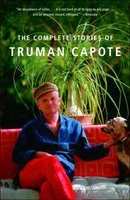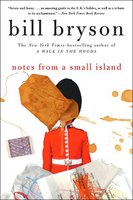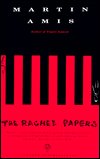The Complete Stories of Truman Capote
 I'm fighting the compulsion to start by reminding you all that I've been loving the Capote since well before all the film and Oscar hype (and I guess that was my not-so-subtle way of getting that point in there after all: I'm nothing if not transparent, after all).
I'm fighting the compulsion to start by reminding you all that I've been loving the Capote since well before all the film and Oscar hype (and I guess that was my not-so-subtle way of getting that point in there after all: I'm nothing if not transparent, after all).I retreated to this collection of short stories after declaring a temporary hiatus from Middlemarch,
The stories, twenty in all, are arranged chronologically, which makes for an interesting study in Capote's path as a writer. His storytelling (predictably) improves as you move through these tales, but from the start he has an amazing gift for strange insights and turns of phrase that reach out to you from the page and insist that you stop and give them a think. (Orwell would be suitably impressed.)
You can also see Capote experimenting with different forms, particularly with his interesting -- if not always one hundred percent successful -- Twilight Zone-esque supernatural tales such as "Miriam" and "The Headless Hawk."
I've mentioned before, but it bears repeating, that Capote's storytelling reaches its zenith with the autobiographical, moving, and deceptively simple story "A Christmas Memory." This collection also houses a similar tale from Capote's childhood, "The Thanksgiving Visitor."
As pure fiction goes, my favourite story in this book is "Mojave," a story-within-a-story about the complex relationship between a woman and her husband.
As different as all these stories are from one another, what they share is Capote's singular vision. As a lifelong outsider, he writes with an outsider's unique perspective about other outsiders.
Notes from a Small Island
 Much as I love Capote's writing, it tends to leave me feeling a bit lonely and hollow inside, so as an antidote I turned to this collection of anecdotes from Bill Bryson's travels around his adopted homeland of Great Britain.
Much as I love Capote's writing, it tends to leave me feeling a bit lonely and hollow inside, so as an antidote I turned to this collection of anecdotes from Bill Bryson's travels around his adopted homeland of Great Britain.If you're not familiar with Bryson's modus operendi, what he likes to do is travel around a place -- the UK, Europe, Australia, the Appalachian Trail -- and then write the shit out of it in a funny, bloggish kind of way.
Funny thing: if you were to ask me who my favourite travel writer is, I don't think I would ever have named Bryson. Tim Cahill, Randy Wayne White, Jon Krakeuer... these are names that leap to mind. But when I was perusing the travel section of my bookcase, I found that I own more of Bryson's books than any other writer. So I guess he is one of my favourites after all. Who knew!
In Notes from a Small Island, Bryson comments on one of the aspects of the British national character he finds most endearing: the Brits' ability to take delight in the smallest things. Throughout his recollections of his travels, it's pretty obvious Bryson has absorbed this characteristic as well. At one point, he rhapsodizes about his fairly generic hotel room:
Nowadays you get a color TV, coffee-making tray with a little packet of modestly tasty biscuits, a private bath with fluffy towels, a little basket of cotton wool balls in rainbow colors, and an array of sachets or little plastic bottles of shampoo, bath gel, and moisturizing lotion. My room even had an adequate bedside light and two soft pillows. I was very happy.After typing that passage, I was about to wax affectionately mocking. I mean, cotton wool balls? Soft pillows? Golly. But then I hit the rewind button and remembered my own reaction to the hotel room Rusty, Sam and I stayed in last week: Ooh, look at the size of this bed! Yay, extra towels! This is the best shower EVER!
Once again humbled by mine own cursed memory. Drat.
I think what I like about Bryson's writing is its accessibility. He's basically a schlub -- just like you or me -- with a passport. He doesn't have grand adventures, though he does have a close call with a rooming house proprietress whom he inadvertantly pisses off by leaving behind the broiled tomato that comes with his "full English breakfast" two days in a row. Imagine!
But he tells his stories entertainingly, unpretentiously, and with the type of self deprecation I'm a total sucker for and which will almost certainly guarantee that I continue to buy every book he writes.
The Rachel Papers
 Now, call this an odd little coincidence, but in Notes, Bill Bryson laments the terrible urban planning that has conspired to ruin huge sections of Oxford. And where is the hometown of the hero (if "hero" is the word I want) of my next book? Yes, Oxford. I'll wait for you to reassemble your totally blown mind before I continue.
Now, call this an odd little coincidence, but in Notes, Bill Bryson laments the terrible urban planning that has conspired to ruin huge sections of Oxford. And where is the hometown of the hero (if "hero" is the word I want) of my next book? Yes, Oxford. I'll wait for you to reassemble your totally blown mind before I continue. I never used to think it was particularly noteworthy that I have a fondness for coming-of-age novels about precocious, annoying, hypocritical young men until I read Carrie's post about The Guardian's survey that found men only read books by men, whereas women read books written by both genders. I certainly fall predictably into the female camp, and I have a particularly powerful affection for Holden Caulfield, Nick Twisp, Adrian Mole, and of course, The Rachel Papers' cheerfully bratty nineteen-year-old protagonist Charles Highway.
Charles has one goal before he turns twenty: to sleep with an Older Woman. He sets his sites on the elusive Rachel, who is as barely two-dimensional as you might imagine (which I think is deliberate on Amis's part). The novel documents Charles's first-person account of the detailed strategems he employs to achieve his mission.
If I were younger when I first encountered this novel, I almost certainly would have disliked Charles Highway. He's pretentious. He's sanctimonious. He's sexist. He's disconcertingly frank about his various bodily functions. But I just can't dislike Charles, and in fact I find him rather charming and endearingly vulnerable. And unlike his overly earnest counterpart Holden Caulfield, Charles is pretty funny. He's not always nice, but he's definitely funny.
What Amis does so brilliantly with this arrogant little twerp is subtly reveal his innocence, which masks as wordliness, and his naivete, which masks as cunning. At the end of the day, Charles is a boy with a child's fears and anxieties about his body, his mortality, his future, and his parents' relationship. I challenge you to read this novel and still dislike Charles at the end, try as you might.
You'd think that, given how much I like this book, I'd have read more of Amis's writing, but no, I haven't. I started to read London Fields
8 comments:
I was introduced to Bryson's writing through The Mother Tongue. His writing cracks me up. A Short History of Nearly Everything is also delightful.
I haven't read The Rachel Papers, so I don't know how similar they are--I did like his Money.
I think everyone should read A Short History of Nearly Everything.
It's a well-written and wonderful book that truly gets you thinking.
One thing I do have to say is that I used to obsess about finishing books. I would not put a book down even if I hated it.
I realized, though, that this was robbing me of time to read things that I liked.
So I stopped that.
So far, every thing that Dave has recommended/given me has been worth the time to read.
I second reading Money; another annoying protagonist that's such a schlub you love him. I wouldn't worry too much about getting excited about little things. Those who get jazzed about the little stuff are destined to be happy. I just back from vacation in another part of Mexico and spent much of the time away enraptured by having hot water. My place is strictly cold-water but that's not too tough when it's 85 plus every day . . .
COMPLETELY off topic, but...
I wanted to thank you for the books I recieved as part of your 'un-booking.' I recieved them today. I've skipped through the Nietzsche, but my 'to read' list is a worse than my 'to do' list... Thanks again!
Sigh. I love me some Bill Bryson. I only discovered him last year during a geography course I was taking. We read neither here nor there as part of the assigned reading (how bithcing was that?!), and his writing clicked with me right away. It's sort of like the best qualities of Dave Barry and Garrison Keillor mashed together. I picked up a few of his other books after that, and my brain has thanked me for it.
I love Bryson -- whenever I'm reading him I end up snorfling to myself and driving my husband batty ("What is it?" "[Snort]" "Tell me!") But I always just have to tell him to read the whole thing.
I found Bryson through The Mother Tongue as well. Have you read A Walk In The Woods?
I've only ever been disappointed in one of his books -- he was starting to sound a little... twee? Reading The Lost Continent, I started to think, "Yeah, okay, I get it. You're a cynical and jaded man of the world and so much more clever than any of these poor rubes you encounter on your trip..."
I had just finished In A Sunburned Country, though, and maybe it was too much of a similar thing at once.
I've read all of Amis's books, and while Rachel Papers is pretty unique--it was his first book--most of his work deals with seriously flawed yet likeable characters. Like previous commenters, I recommend Money, and perhaps give London Fields a try again, for the sake of Keith. And Time's Arrow is amazing in an entirely different way.
Post a Comment